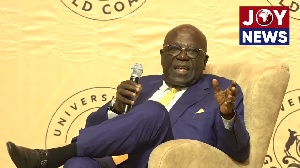Africa News of Friday, 4 April 2025
Source: www.ghanawebbers.com
Africa Braces for Economic Hit As Trump's Tariffs End U.S. Trade Perks
President Donald Trump has announced new tariffs that are changing trade relations between the United States and several African nations. Many of these countries have enjoyed preferential agreements with the US for decades. The tariffs were unveiled at the White House on Thursday, which Trump called "Liberation Day." They will impose a minimum 10 percent tariff on all imported goods starting April 5. Additional tariffs will target countries with large trade deficits with the US, beginning April 9.
South Africa has expressed concern about these new measures. The country labeled the tariffs as "unilaterally imposed and punitive." South Africa warned that they would create barriers to trade and shared prosperity. It is the second largest trading partner of the US in Africa, after China. In 2024, South Africa exported $14.7 billion worth of goods to the US, particularly in automobiles, agriculture, and pharmaceuticals.
The South African presidency emphasized an urgent need for a new trade agreement with the US. Oscar van Heerden from the University of Johannesburg stated that these tariffs would have serious consequences. He noted that many are now reassessing their financial implications due to this new regime.
Van Heerden described Trump's approach as disruptive. He believes this tariff decision aims to provoke strong reactions from other countries. Once negotiations begin, he suggested that the Trump administration will reveal its true demands. For South Africa, this could involve compromising on issues unrelated to trade.
Lesotho is among the hardest-hit countries by these tariffs. It now faces a 50 percent levy on exports to the US. Lesotho's head of economics noted this could be seen as retaliation since it charges high tariffs on US goods. In 2024, Lesotho exported $237.3 million worth of goods to America while importing only $2.8 million.
Textiles make up a significant portion of Lesotho's exports to the US, accounting for 40 percent of local jobs. The new tariff threatens those jobs—around 40,000 are at risk according to Makhetha. He warned that unemployment and rising prices could lead to political unrest in Lesotho.
Lesotho's currency is pegged to South Africa's rand, which has recently dropped in value making imports more expensive for them. Other affected countries include Madagascar (47 percent), Mauritius (40 percent), Botswana (37 percent), Angola (32 percent), Libya (31 percent), Algeria (30 percent), Tunisia (28 percent), Côte d'Ivoire (21 percent), and Nigeria (14 percent).
Makhetha mentioned it’s too early for quick solutions but suggested boosting exports of minerals to Europe and Asia might help Lesotho adapt. He also noted that Trump's policies could inadvertently strengthen support for the African Continental Free Trade Area.











